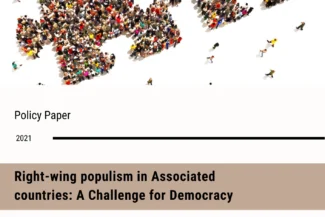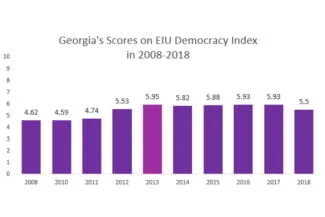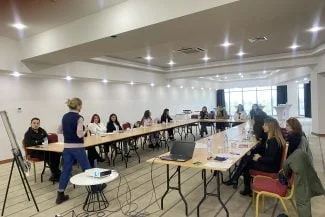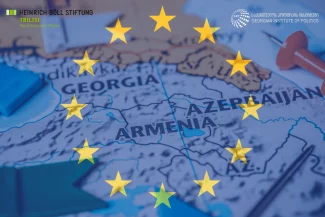The GIP held an online discussion “Georgia’s Europeanization Beyond 2020: Assessing Progress, Identifying Challenges” on April 14, 2021. The event brought together Georgian and international experts, academics and public officials to discuss the future of EaP framework and Georgia’s Europeanization agenda.
Currently Eastern Partnership has reached the turning point – as the 2020 agenda is over, it is in between frameworks. The EaP summit that should set new goals has been postponed till October 2021, and the contours of the future directions are only getting set up. The event aimed to take a deeper look at how Georgia is progressing, and how implementation of the previous – 20 Deliverables for 2020 – agenda affects Georgia’s standing with the EU, including membership perspective.
The keynote was delivered by Asuncion Sanchez-Ruiz, representing the EU Delegation, who shared what to expect from the upcoming EaP summit and how the future EaP framework might look, including the priority areas and the next steps for the European Commission.
The three policy briefs presented at the discussion highlight the challenges on the way to Europeanization:
In his policy brief “One Step Forward – One Step Back: The Dilemma of State Resilience in the Absence of Coordinated Policy“ Dr. Shalva Dzebisashvili speaks about the extent to which Georgia is fulfilling its commitment to NATO and the EU to increase resilience, which in turn reflects on Georgia’s desire and ability to speed up the membership process – as well as the response from the EU and NATO on these efforts.
Dr. Bidzina Lebanidze and Dr. Tinatin Erkvania analyse the impact of judiciary reform on Georgia’s Europeanization in their policy brief “The Judiciary Reform in Georgia and its Significance for the Idea of European Integration”. At the time of publishing the policy brief, conditionality was not yet considered – but it has now been put on the table by Danielson and reiterated by the MEPs’ statement on Georgia. While the EU does not apply strict conditionality on Georgia for now, these challenges may become a major stumbling block for Georgia’s next steps in the process of the European integration.
Dr. Tinatin Akhvlediani has assessed Georgia’s progress in economic development, raising a question of what prevents Georgia from reaping the benefits of aligning its laws with the EU. Her policy paper “2020 Deliverables: How Strong is Strong Enough for Georgian Economy?”reviews the progress made by Georgia on delivering economic strengthening by 2020 and puts forward actionable policy recommendations for Georgia, as well as for the EU.
The event summarized GIP’s project “Assessing Georgia’s Progress in 20 EaP Deliverables for 2020”, implemented with the support of the Embassy of the Kingdom of the Netherlands in Georgia since October 2019. Within the project GIP completed the following activities:
- In cooperation with 14 Georgian civil society organizations, published a report on 20 Deliverables implementation by Georgia;
- Organized a closed discussion with international partners and the Georgian Ministry of Foreign Affairs, to share the summary assessment of the 20 Deliverables for 2020 implementation and suggestions for the future framework and its monitoring.
- Organized two discussions in the regions on Deliverables that were particularly relevant for local civic activists: environment protection, civil society development, participation in research and innovation programs, and young people’s skills;
- Followed up by 3 policy briefs on economic development, security and resilience building, and judiciary reform and its impact on Georgia’s relations with the EU.








